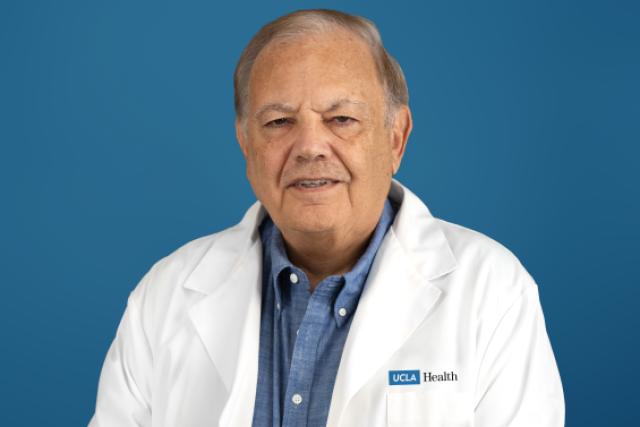Targeted therapies are revolutionizing the fight against breast cancer, leading to significant improvements in patient survival and quality of life. UCLA Health’s cancer researchers are at the forefront – and have been for more than two decades – largely by building on the success of their previous innovations.
Herceptin (trastuzumab) was an early breakthrough breast cancer therapy. Then came the initial targeted inhibitor CDK 4/6, palbociclib (Ibrance), for women diagnosed with advanced estrogen receptor-positive, HER2-negative breast cancer. These led to trastuzumab deruxtecan (T-DXd), improving progression-free survival compared to standard chemotherapy for some patients with advanced breast cancer.
With the advent of newer therapies combined with a better understanding of tumor biology, researchers have developed targeted treatments that are more effective and less toxic, which can improve survival, says Aditya Bardia, MD, program director of Breast Medical Oncology, assistant chief of Translational Research in the Division of Hematology-Oncology at UCLA Health and professor of medicine at the David Geffen School of Medicine at UCLA.
“And furthermore, with rapid translation of new findings from lab to clinic and back, the team is dedicated to improving clinical outcomes and cure rates,” says Dr. Bardia, who is also the director of Translational Research Integration and a member of the UCLA Health Jonsson Comprehensive Cancer Center.
Herceptin a game-changer
UCLA Health has long been a leader in bringing groundbreaking breast cancer therapies to market. That was the case with the drug Herceptin (trastuzumab), an antibody developed by a team of scientists led by oncologist Dennis Slamon, MD, PhD, director of Clinical and Translational Research at the UCLA Health Jonsson Comprehensive Cancer Center and chief of hematology/oncology at the David Geffen School of Medicine.
Herceptin targets the HER2 gene, which is overexpressed in about 25%-30% of breast cancer cases and is associated with HER2-positive breast cancer. The HER2 alteration occurs when too many copies of the HER2 gene are produced in the tumor cells. Herceptin works by attaching itself to the HER2 protein to stop its functioning while also identifying it to the immune system more effectively.
Since its introduction in 1998, Herceptin has saved the lives of nearly 3 million women.
More breakthroughs
Dr. Slamon and his team also spearheaded the development of the initial targeted inhibitor CDK 4/6, palbociclib (Ibrance), approved in 2017 by the U.S. Food and Drug Administration with a Breakthrough Therapy Designation for women with advanced estrogen receptor-positive, HER2-negative breast cancer, the most common subtype of the disease.
By targeting the CDK 4/6 enzyme involved in regulating cell division, palbociclib prevents the cells from dividing and multiplying uncontrollably.
Palbociclib and other drugs in its class have led to the largest improvement since the introduction of hormone therapy for breast cancer in the 1970s, effectively doubling the number of women who live without recurrence of cancer.
Then, in September 2024, another breakthrough: The FDA announced its approval of ribociclib (Kisqali) in combination with an aromatase inhibitor for the treatment of people with HR+/HER2- stage 2 and stage 3 early breast cancer who were at high risk of recurrence, including those with node-negative disease.
In a news release, Dr. Slamon, the trial lead investigator, called it “a pivotal moment in improving our approach to care. Today’s approval allows us to offer treatment … to a significantly broader group of people as a powerful tool that, combined with endocrine therapy, can help further minimize their risk of cancer returning,”
Dr. Slamon was awarded the 2024 Szent-Györgyi Prize for Progress in Cancer Research from the National Foundation for Cancer Research for his groundbreaking contributions to the field.
Antibody-drug conjugates
Through these successes in targeted therapies, researchers continually seek treatments to improve efficacy but, more importantly, reduce toxicity to healthy cells. Applying the lessons learned from Herceptin and other targeted therapies, a team of researchers led by Dr. Bardia found trastuzumab deruxtecan (T-DXd) significantly improves progression-free survival compared to standard chemotherapy for patients with advanced breast cancer who have limited treatment options.
During a phase 3, multicenter open-label trial, patients were randomly assigned in a 1:1 ratio to receive T-DXd or the physician’s choice of chemotherapy.
Of the 866 patients who underwent randomization, 713 had HER2-low disease and 153 had HER2-ultralow disease. Among the patients with HER2-low disease, the median progression-free survival was 13.2 months in the trastuzumab deruxtecan group and 8.1 months in the chemotherapy group.
The study results were published in The New England Journal of Medicine in September 2024.
Building upon the success of Herceptin, T-DXd takes the science a step further by linking the HER2 antibody with a powerful chemotherapy agent, allowing it to deliver cancer-killing drugs preferentially to the cancer cells.
Whereas Herceptin was combined with chemotherapy separately, T-DXd delivers it all in one package, Dr. Bardia notes.
“This study demonstrates that antibody-drug conjugates, building on prior work with antibodies, can improve therapeutic efficacy while lowering toxicity,” he says. “We are excited about developing additional immunoconjugates with newer targets and with newer payloads to essentially replace toxic chemotherapy and improve clinical outcomes for patients with, not just breast cancer, but other cancers as well.”
The drug was previously approved for use in later-line settings for patients with HER2-low tumors, but this study shows that T-DXd could be used earlier instead of chemotherapy in a broader patient population with advanced breast cancer.
The drug was given a Breakthrough Therapy Designation and on Jan. 27, 2025 was approved by the FDA for commercial use.





